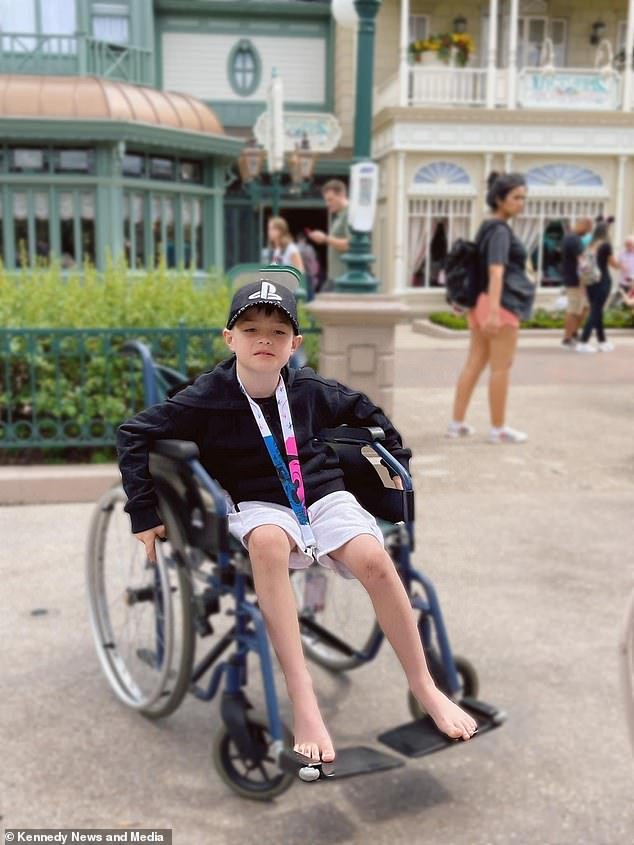An 11 year-old boy was diagnosed with a devastating degenerative disease after his mother spotted an alarming sign during his exercise routine.
Leo Powell became a fan of social media fitness guru Joe Wicks back in 2020, and enjoyed taking part in his online PE classes while in lockdown.
But his mother Kelly, 36, grew concerned when she watched him and younger sister Emmie attempt the warm up — which involved star jumps.
Leo’s arms and legs were ‘everywhere’ and did not resemble a star, said Ms Powell, who is from Birmingham but now lives in Teignmouth, Devon.
‘His younger sister, who is 14 months younger than him, was doing it perfectly. We all laughed, but that’s when I noticed something wasn’t right.’
Looking back now, there were other signs that Leo’s development wasn’t quite right.
Ms Powell, who works as a carer, recalled Leo leaning to one side when he walked sometimes, ‘like he was drunk’.
She added that he was very flexible and would sit in a ‘weird’ way with his legs behind his head, like a ‘pretzel’.

It was only after seeing her son struggle with star jumps during a session of Joe Wicks’ exercise class that Kelly Powell realised something was seriously wrong.
She had expressed concerns to his primary school, who reportedly dismissed them as he was doing well academically.
But following the star jumps incident, she decided to seek medical help.
Doctors initially thought Leo had ‘flat feet’ and would need special shoes, which Ms Powell rallied against.
‘Other people couldn’t see it but I could,’ she said. ‘I could feel something wasn’t right.
‘I don’t think the paediatrician took him seriously the first time. He said there’s nothing neurologically wrong and that he just had flat feet and should get some special shoes for that.
‘The school didn’t help because his problem was not mental and he was doing well academically.
‘Last year my mum hugged Leo and noticed that he was twitching. She said that didn’t look right.’
One afternoon, Leo came home from school with a bruised face — his balance problems had resulted in a nasty fall.

Leo was eventually diagnosed with devastating Friedreich’s ataxia — a genetic condition that attacks the nerves.
‘He came home with his face bruised, and I thought, I can’t take this anymore, I don’t know when we’re going to see this physiotherapist.
‘I was panicking. I called the doctor and cried on the phone, saying I need somebody to see my son.
‘I felt helpless because I didn’t know what to do.’
A few weeks later came another fall; this time at night, which preceeded a seizure that caused him to chip his tooth.
It wasn’t until February 2024 that Leo was seen by a paediatrician and underwent multiple tests at hospital, including an MRI scan, hearing, and eye tests.
Eventually, the family received the ‘heart-sinking’ diagnosis of Friedreich’s ataxia — a hereditary condition that affects around one in 50,000 people and affects the body’s nerves and the heart.
Symptoms include problems with walking and balance, slowed speech and heart palpitations, which get worse over time.

Mum Kelly said Leo’s balance and walking were also warning signs – as he often leant to the side as if he was ‘drunk.
It dramatically increases the risk of a range of life-threatening problems including myocarditis and heart failure.
The condition is life-limiting, although many of those with the condition live until at least their 30s, and some into their 60s or beyond.
The Powell family were told that Leo suffered scoliosis, kyphosis (excessive rounding of the upper back) and peripheral neuropathy, resulting from the condition.
‘My heart sank when they told me,’ said Ms Powell. ‘I cried night and day, silently screaming to myself thinking how am I going to tell him. How to tell an 11-year-old he could be in a wheelchair for the rest of his life?
‘He took it really well, although he was obviously disappointed.
‘He deals with everything with his brilliant sense of humour. It’s what’s got us through. He falls over and laughs.
‘It could not have happened to a worse person. We used to walk for hours and explore. He is always the one asking to go out on walks and explore, he loves wildlife.’
Today, Leo has limited mobility and can only walk short distances while he waits for a wheelchair and walker.
‘Leo will be sitting at home during half term while other kids are going shopping and playing, but he can’t get about,’ said Ms Powell.
The family have now set up a GoFundMe page to help raise money for Leo’s physiotherapy sessions, which is thought to delay him needing a wheelchair for as long as possible.
Mr Powell said: ‘He is a good, sweet boy.
‘He likes playing games, loves nature, history, and animals. He wants to fulfil his dreams of working at a zoo or becoming a vet.’

